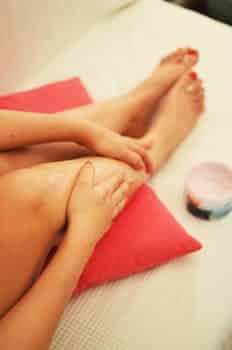
Vaginal Varicose Veins – Is that even a thing?
If you have even heard of vulvar varicosities, chances are it is because you have experienced them. And it is likely you had to work ridiculously hard to uncover any information about the topic. Varicose veins of the vulva and perineum just don’t get a whole lot of press. Commonly quoted estimates state that about 10 percent of women will experience vulvar varicosities during pregnancy, but it is possible that number is higher because some women just won’t talk about it.
And if you look at the rare online discussion about vaginal varicose veins, like JustMommies.com you will see that women who experience the symptoms of vulvar varicosities are completely surprised when it happens—because they had no idea such a thing could even happen.
Let’s change that!
Let’s get women the information they need to live more comfortable, more present lives. Let’s start talking about it. Let’s take it from being a thing to just being, you know, a thing. If we need to, let’s talk to our sisters, our girlfriends, our wives, our mothers. And, if you have any questions about this or any other vein issue, another great person to talk to is a qualified vein specialist.
Vulvar varicosities: But Why?!
Basically, it is possible to develop a varicosity in any part of the body. But there are a few reasons why your vulvar area can be susceptible.
- Gravity. Baby and placenta put a lot of pressure on the pelvic region, and this creates back pressure on the veins in the pelvic floor.
- Hormones. The pregnancy hormones that are circulating to prepare your pelvis for birth also make your veins—all of your veins—prone to distension. Estrogen, progesterone and relaxing all play a part.
- Mechanics. The venous valves that are designed to provide some protection against pooling of blood in lower regions occur less frequently the closer the vein is to the heart. In a small percentage of women, there are no venous valves in the vulvar area.
Some Good News About Vaginal Varicose Veins (and a Little Bad News-but Mostly Good)
Let’s start with the good...
- Good news—they are transient. Chances are good that they will go away once baby is born.
- Bad news—they are transient. If you get them once, vulvar varicosities will come back—and likely sooner—with each subsequent pregnancy. As well, with each pregnancy, there is an increasing chance that they will stay, even after the baby is born.
- Bad news—they could be a sign of more ominous things. It is possible that vulvar varicosities are a sign that you have developed, or are developing, Chronic Venous Insufficiency (CVI), especially if they appear with varicose veins in your legs. A qualified vein specialist can look at your veins and tell you if this is the case for you.
Here's the Really Good News
The really good news, though, is that if varicosities do appear during pregnancy, and don’t go away once baby is born, there are vulvar varicosity treatments available that can get you back to feeling like your old self with minimal fuss. A qualified vein specialist like Dr. Jilanne Rose from Advanced Vein Institute of Arizona (AVIA) will be happy to talk to you about your options. However, as she wants you to have the most successful experience possible, she will caution you about the timing of treatments.
“One thing to keep in mind is that if you are currently or recently pregnant, you will have to wait a bit before a vein specialist can treat you,” Dr. Rose says. “Birth will relieve much of the pressure on the area. However, your body will need some time—at least a few months—for hormone levels to return to normal and for your body to re-adjust. In the end, you might not even need treatment.”
While you wait, Jilanne has a few suggestions you can try to find some temporary relief from the symptoms of vulvar varicosities.
More good news: it is really easy to talk to Jilanne. Call the office or fill out this form if you would like to get a conversation started about whether vein treatment is what you need to get back to living more comfortably.
Q & A Pregunta: ¿Qué es el tiempo de induración? Respuesta: el downtime se basa en gran medida en el tipo de intervención y la severidad de la enfermedad venosa. Independientemente del tipo de intervención, nuestros pacientes reanudan todas las actividades el mismo día que el tratamiento. Algunos tratamientos requieren medias de compresión post-procedimiento, pero…
Read MoreQ & A Question: What is the down time? Answer: Downtime is largely based on the type of intervention and severity of the vein disease. Regardless of the type of intervention, our patients resume all activities the same day as treatment. Some treatments require compression stockings post-procedure, but most times these are worn for comfort and…
Read MoreVenas dolorosas y antiestéticas de las piernas Con el calor de Arizona, un día de verano, día de invierno, o cualquier día es ideal para usar shorts. Pero para aquellos con varices o venas de araña, la idea de usar pantalones cortos es preocupante y lleva a la ansiedad severa. Según el Departamento de salud…
Read MorePainful and unsightly leg veins With the Arizona heat, a summer day, winter day, or any day is ideal for wearing shorts. But for those with varicose veins or spider veins, the thought of wearing shorts is troubling and leads to severe anxiety. According to the U.S. Department of Health and Human Services, 55% of…
Read MorePregunta: ¿dos ultrasonidos Doppler encuentran cualquier coágulo de pierna? (Muslo o pantorrilla). ¿Es el síndrome de mayo-Thurner (MTS) posible y un venography necesario en mi caso?
Read MoreQuestion: Would two Doppler ultrasounds find any leg clots? (Thigh or calf). Is May-Thurner syndrome (MTS) possible and a venography necessary in my case?
Read MoreSi quisiera deshacerse de las venas antiestéticas, las venas de araña, o las varices dolorosas; a continuación, la búsqueda de resultados de escleroterapia, a través de un especialista en la vena, puede ser la elección correcta para ayudar a mejorar su dolor, la felicidad y su apariencia. En este procedimiento rutinario, el médico de la…
Read MoreIf would like to get rid of unsightly veins, spider veins, or painful varicose veins; then pursuing sclerotherapy results, through a vein specialist, may be the right choice to help improve your pain, happiness, and your look. In this routine procedure, your vein doctor injects a chemical into the veins which will cause the veins…
Read MoreParece concebible que cuando los expertos en Salud estiman que el 10 por ciento de las mujeres embarazadas experimentan várices vulvares, es decir, varices vaginales, podrían subestimar groseramente la incidencia de esta afección. Hay mujeres — que saben cuántas — que no reportarán este dolor, picazón, pesadez e incomodidad general en la vulva, ya sea…
Read MoreIt seems conceivable that when health experts estimate that 10 percent of pregnant women experience vulvar varicosities, that is to say vaginal varicose veins, they could be grossly underestimating the incidence of this condition. There are women—who knows how many—who will not report this pain, itch, heaviness and general discomfort in the vulva, either because…
Read More


